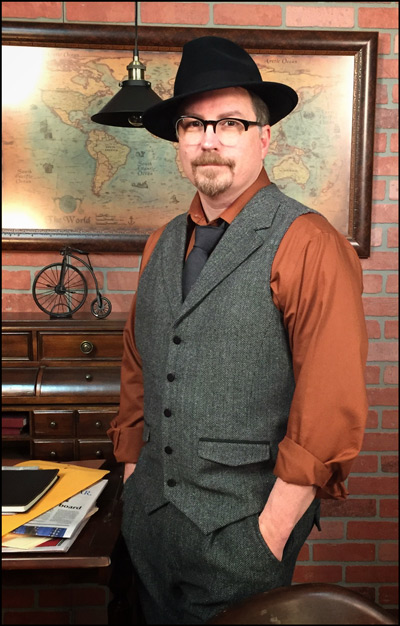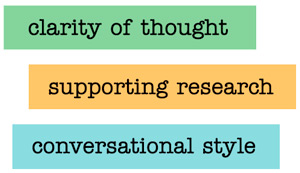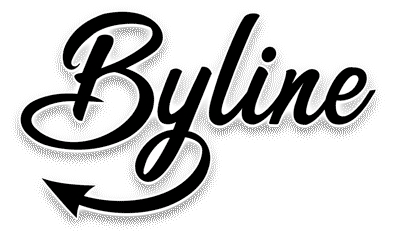How Journalism Trains the Mind to Write Great Essays
The Story Behind Byline
For years, families have been asking Daniel Schwabauer, the creator of the highly-praised Cover Story and One Year Adventure Novel, to “PLEASE produce a curriculum for writing essays!” Here Daniel shares why and how Byline is his answer to this frequent request!
 Daniel writes…
Daniel writes…
“Byline is a Language Arts curriculum that focuses on journalism. On the surface, a journalism course may not seem to teach essay writing, but the truth is, the skill set required for journalism translates to writing strong essays. It translates so well that I would go as far as to say that it results in better essays than those produced by students consciously concentrating on the formal essay structure. That the connection isn’t obvious, is, in its way, a terrific asset for me as a teacher, because many teens balk at the thought of essays, but get them thinking about newspaper reporting, and they are intrigued.
“The journalism training in Byline could be more accurately termed chronojournalism. Which is my way of saying that we are reporting on the past—giving readers “Yesterday’s news today.” So we study history as well. And that unique combination of Language Arts, journalism, and history is what gives Byline its distinctive theme. It’s why I chose the 1930s for my setting. Before World War II, big city newspapers were still the most powerful media in the world. And modern kids think of the 1930s as ancient history.
“But none of this is really the point. I did NOT create Byline just to offer a quirky journalism class. As I hinted above, Byline does three things that won’t be obvious to students.
First, it’s designed to teach critical thinking skills.
![]() “In particular, the skills of observation, inference, analysis, and interpretation. These skills are essential to writing, and to every other subject. But too often they’re separated from other disciplines. Writing is about putting thoughts onto paper. If you can’t think well, you won’t write well.
“In particular, the skills of observation, inference, analysis, and interpretation. These skills are essential to writing, and to every other subject. But too often they’re separated from other disciplines. Writing is about putting thoughts onto paper. If you can’t think well, you won’t write well.
Second, I want to inoculate students against propaganda.
“Yes, the sort of propaganda that has taken over social media, and, to be honest, pretty much EVERY form of media. Propaganda isn’t about telling lies. It’s about creating interpretations of facts. This is why every major media outlet can both fact-check its work AND be perceived by political rivals as biased.
“The student who learns to separate fact from interpretation is much harder to indoctrinate. And I think that is a worthwhile outcome, whatever your political convictions happen to be. As I tell Byline students early in the course, we’re not living in the information age. We’re living in the MISinformation age.
The third thing Byline does is teach essay writing.
“This may be the most important, at least in terms of scholarship. It’s a secret I don’t reveal to students until the very last lesson. And I hope you will help me keep that secret.
“The main reason it’s structured as a chronojournalism class is to remove the expectation that writing essays has to be boring. In fact, I only use the word “essay” a few times before lesson 72, and even then it’s in reference to things other than the assignment.
“Modern education often sees the essay as a canvas for academic jargon. So we make students memorize latinate terms like exposition and delineation and empirical persuasion—which is fine—but we don’t tell them why these terms matter, or what they can be used for.
 “We take the storytelling out of it. We suck out the conflict and the humor and the personality, and then expect them to learn to be good writers by outlining a five-paragraph theme about the Freudian implications of blood in Macbeth.
“We take the storytelling out of it. We suck out the conflict and the humor and the personality, and then expect them to learn to be good writers by outlining a five-paragraph theme about the Freudian implications of blood in Macbeth.
“It’s crazy. And it gets even worse after high school. I’m NOT saying that English professors are looking for jargon in their Freshmen and Sophomore essays. On the contrary, I think most professors would agree with me that such writing is the bane of their existence. The problem is, by the time most students get to college, they think this is what good academic writing is supposed to look like.
“College professors then have to wage a frustrating war of red ink. They have to strip students of the illusion that making sentences longer and grammatically obtuse somehow makes them more literary.
“The opposite is true. Clarity of thought and presentation will set any college student apart. For that matter, it will set any writer apart. C.S. Lewis wasn’t just admired for his imagination. One of the main reasons his work endures is that he was so good at saying profound things in a simple way. He knew the jargon. He just avoided it. And I can promise you that a student who practices essay writing using a more relaxed and personable style—for instance, the style employed by journalists—will have a huge advantage over students who don’t.
 “When most English professors encounter a student who thinks clearly, supports her conclusions with evidence, and makes an argument in a conversational style, they are delighted. They start saving that student’s papers to read last, like dessert.
“When most English professors encounter a student who thinks clearly, supports her conclusions with evidence, and makes an argument in a conversational style, they are delighted. They start saving that student’s papers to read last, like dessert.
“And those three things are, coincidentally, what chronojournalism teaches: clarity of thought, supporting research, and a conversational style.
“That’s it. Byline in a nutshell.”

